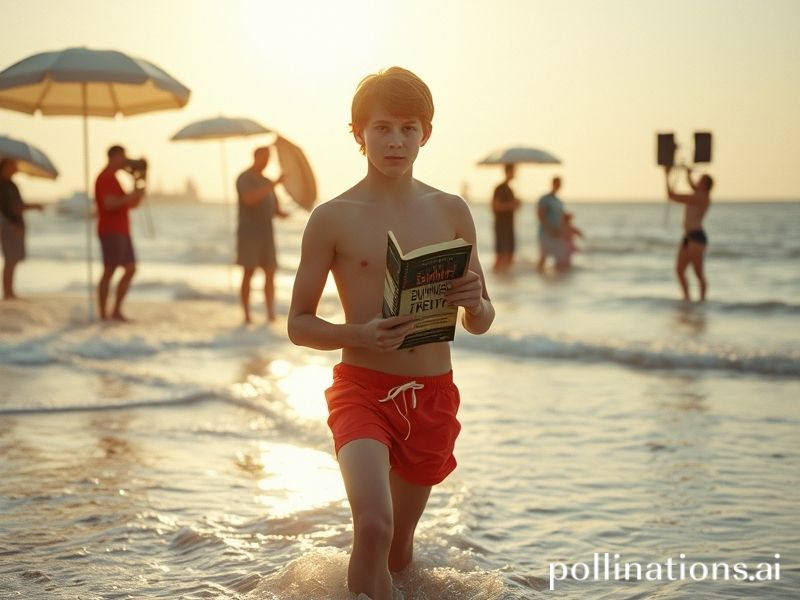tsitp movie
PARIS—Somewhere between the croissants and the creeping dread of late-stage capitalism, the world received its latest cinematic love letter: “The Summer I Turned Pretty” (colloquially “TSITP”) has been adapted into a feature-length film. Global markets trembled—mostly because teenagers collectively emptied their parents’ streaming-service budgets, but still, tremors were recorded in Singapore, São Paulo, and that one Wi-Fi dead-zone café in Prague.
For the blissfully uninitiated, TSITP chronicles the eternal triangle of Belly, Conrad, and Jeremiah—three genetically improbable adolescents who spend one fateful summer discovering hormones, heartbreak, and the fact that beach houses apparently come with unlimited artisanal ice cream. The books already sold a modest 12 million copies worldwide, proving that angst, like microplastics, is now found on every shore. Turning the trilogy into a two-hour film is therefore less artistic gamble than geopolitical inevitability: when American YA fiction achieves NATO-level cultural penetration, you either adapt it or risk being labeled a rogue state by TikTok.
International distributors smelled blood in the water—rose-scented, SPF-50 blood. Amazon Prime secured exclusive streaming rights from Reykjavik to Rangoon, ensuring that Icelandic teens can now watch sunburned American privilege in 4K HDR while their own summer lasts exactly forty-eight hours and a single puffin. Meanwhile, France’s Canal+ negotiated a dubbed version in which the characters philosophize about l’amour while chain-smoking Gauloises; subtitles translate “I’m not crying, you’re crying” into “Ce ne sont pas mes larmes, c’est la pluie sur le capitalisme.” Germany insisted on an edited cut that removes all reckless boat usage, replacing it with mandatory life-vest seminars. Bureaucracy, like sand, gets everywhere.
The film’s release sparked a secondary wave of soft-power diplomacy. South Korea’s presidential office issued a statement praising the movie’s “universal themes of longing,” conveniently forgetting that their own youth are too busy studying for exams to experience actual longing. China quietly banned it after censors noticed a fleeting shot of a Tibetan prayer flag reflected in a character’s sunglasses. In Nigeria, bootleg DVDs arrived within 72 hours, complete with bonus commentary from a Lagos street vendor explaining that “Conrad’s emotional constipation is clearly symbolic of IMF loan conditions.”
Economists, ever the buzzkills, point out that TSITP’s merchandising—limited-edition beach towels, heart-shaped lockets, and a suspiciously flammable line of scented candles—will goose Q3 retail numbers across three continents. Goldman Sachs issued a note titled “Teen Melancholy as Asset Class,” recommending long positions on waterproof mascara manufacturers. The IMF, not to be outdone, is rumored to be drafting a working paper on “Seasonal Affective Displacement via Streaming Media,” which sounds like satire until you remember they already did one on Pokémon Go.
Culturally, the film lands at an awkward moment: half the planet is on fire, the other half is underwater, and we’re all doom-scrolling between heatwaves. Watching impossibly attractive fictional teens worry about which equally attractive fictional teen loves them feels like sipping a piña colada during a Category 5 hurricane—delusional, yet weirdly comforting. Stockholm syndrome, but make it premium content.
Yet beneath the gloss lies a darker truth: TSITP’s global success confirms that universal adolescence is now curated by algorithms, packaged by conglomerates, and shipped in climate-controlled containers. Our collective nostalgia has been outsourced to a writers’ room in Burbank, monetized in Luxembourg, and streamed back to us with personalized adverts for antidepressants. The circle of late-capitalist life is complete, and it smells faintly of coconut-scented despair.
In the end, the film will fade, the merch will fray, and Belly will still be choosing between emotionally unavailable boys while glaciers weep into the sea. But for two shiny hours, the planet’s teenagers will synchronize their heartbreak across time zones, proving that even in an age of fragmentation, human beings can still unite around the truly important things: beach bonfires, ill-advised kisses, and the comforting lie that summer lasts forever.







